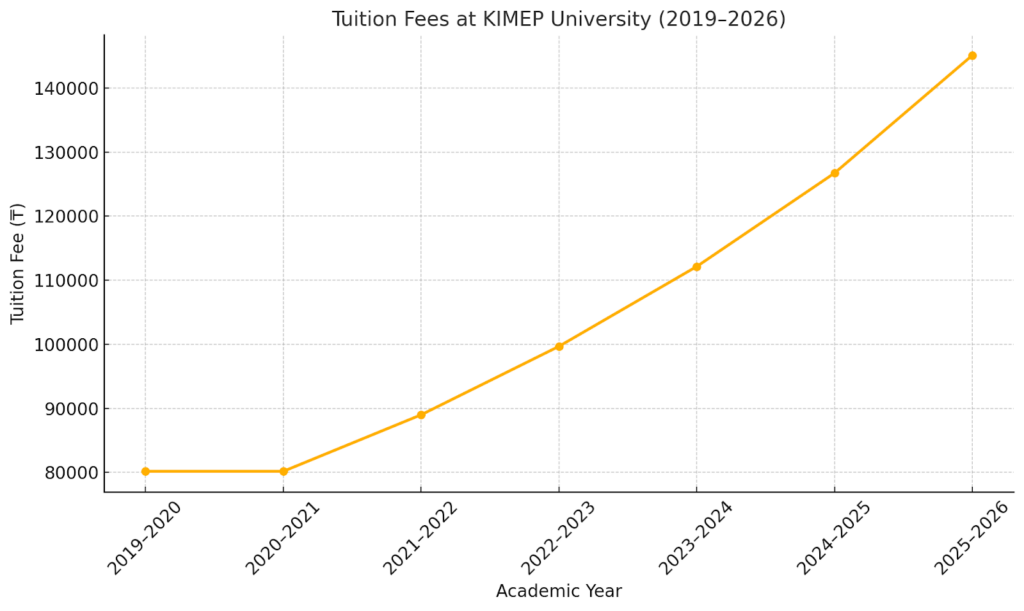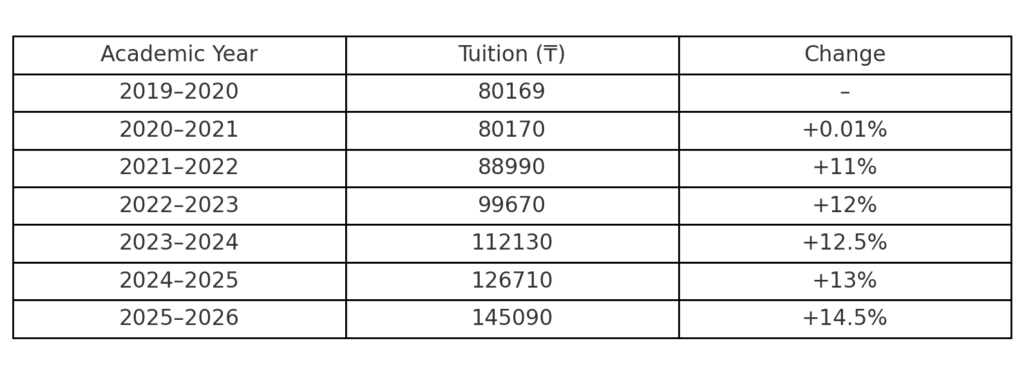In a response to growing student frustration, KIMEP University President Dr. Chan Young Bang met with students and faculty to discuss a proposed 14.5% tuition increase and the university’s financial challenges in a general meeting in the KIMEP University library on Jun. 12. Previously, KIMEP had been charging 126,710 tenge per credit, which has now increased to 145,090 tenge per credit as of the 2025-26 academic year. The open forum, convened by the KIMEP Student Association (KSA), addressed topics including rising costs, scholarship policies, the role of international faculty, and the university’s overall financial health. Students voiced concerns about affordability and transparency, while Dr. Bang and professors defended the increase as necessary to maintain KIMEP’s quality of education in the face of ongoing economic turbulence.
Dr. Bang’s Personal Story
Dr. Bang opened the meeting by drawing upon his past. He recalled working 16-hour days as a student in the United States, skipping meals and “surviving on canned fish” to pay for his education.
“So when I hear about your struggles, I don’t take them lightly. I understand,” he said. “I truly understand the pain and burden you and your families feel due to high tuition costs.”
The university founder said that for every five tuition-paying students, one student studies on scholarship, and over the past 15 years, he has personally donated over a million dollars to help those who cannot afford tuition. Dr. Bang recounted how KIMEP was founded at the request of President Nursultan Nazarbayev in 1989, and how he returned in the late 1990s to save the institution from financial collapse, investing his own money and privatizing KIMEP to keep it afloat.
Student Concerns: Tuition vs. Cash Reserves
The first student to speak was a second-year BCB student, Ismet Jumabay. Jumabay pointed out that KIMEP’s position in the QS world university rankings had slipped from around 800th to beyond 1,200th in the past two years, even as tuition continued to increase. Additionally, Jumabay mentioned that KIMEP scholars are not publishing enough in world-class research journals. Citing university financial reports, he noted KIMEP holds cash reserves (around $20 million as stated by Dr. Bang) and has run annual surpluses – “around 1 billion tenge in 2023 and 500–800 million tenge in 2024,” he said.
Concluding his remarks, Jumabay asked, “Do we have the opportunity to decrease prices by using our cash resources?”
In response, Dr. Bang defended the university’s financial strategy and unique position as a private, non-profit institution. He stated that, unlike national universities, “KIMEP University doesn’t receive one tenge” of government funding. By contrast, he said, a top school like Nazarbayev University receives over $25,000 per student annually in government subsidies to offer free education.
“You could have gone to Nazarbayev University, Agrarian University, or KBTU, where you don’t pay one tenge,” Dr. Bang said.
He also compared KIMEP’s fees to elite private high schools in Almaty.
“Do you know how much they charge at an international high school? $27,000 for high school,” he said.
Dr. Bang acknowledged KIMEP’s cash reserves but explained that much of that money is earmarked for crucial needs.
“It looks like a lot of money, but it’s not,” said Professor Cole Russing, Chair of the Department of Media & Communications, later during the meeting. He explained that maintaining campus facilities and infrastructure can rapidly consume those funds. Students in Russing’s design class identified numerous campus problems to fix, “and 95% of them are coming out of that cash reserve fund for deferred maintenance,” he said.
Dr. Bang said that as a non-profit organization, any surplus KIMEP generates is reinvested into the university.
“Do you think the proprietor takes even one tenge from the university? This is a non-profit. The owner cannot take even one tenge in the form of tuition,” he said.
The Role of International Faculty and Scholarships
The president then confronted the trade-offs that would be implied by lowering tuition or freezing it at the previous rate. He repeatedly challenged students to consider which sacrifices they would make to reduce costs. He also asked whether KIMEP should get rid of all the foreign faculty and replace them with cheaper local professors, or if it should drop the scholarships for students in need, if the university could not raise revenue. Either choice, he said, would damage KIMEP’s character and quality.
“Only rich kids with a lot of money can go to KIMEP – this is not my vision,” Dr. Bang said. “I want to educate everyone regardless of whether you have money or you don’t,” he said.
“If we do not hire international professors, then quality will suffer and we cannot get accreditation,” Dr. Bang said, noting that Kazakhstan does not yet produce enough PhD-holding professors locally.
KSA President’s Response: Student Advocacy
Then, KSA President Amirzhan Yessenov took the floor to speak on behalf of the student body. Yessenov explained that during initial budget committee hearings in the fall and spring, student representatives had attempted to negotiate down the tuition hike, but “did not really have the courage to speak against it.” It was the request of ordinary students, over 230 of whom signed a petition against the 14.5% increase, that pushed the KSA to request the Jun. 12 meeting. The student government collected signatures in two days due to “the urgency of the issue.”
“We stumbled upon the cash reserves policy, which states that the cash reserves of KIMEP may be used to cancel some of the strain,” he said. “We’ve propagated [sic] for an increase of 10%, which the students will take, and the rest of the 4.5% to be taken from the cash reserves.”
In reply, Dr. Bang urged students to look at the long-term vision.
“I sent a letter to the President saying that because of the Russia–Ukraine war, I’m afraid there will be another inflation,” Dr. Bang said. “I cannot promise you that in the future there won’t be another shock. We may have to increase tuition, or we have to shut it down.”
Dr. Bang even stated he had offered to abandon his stake in KIMEP if the government thought it could do a better job.
“If you can run better than me, you take it. These are 60%, you don’t have to pay,” he said. “Take it, goodbye. It’s my legacy.”
Faculty Support: A Shared Responsibility
Throughout the event, faculty and staff backed Dr. Bang’s perspective. The Interim Dean of the College of Social Sciences, Dr. Milen Filipov, spoke up to support the point that KIMEP is an institution that students choose, knowing the costs.
“If you’re here, you’re ready to pay the price. And there are 120 other options,” he said. “There are challenges that the university faces. We need to face them together.”
Another perspective came from Russing, who offered a personal anecdote to illustrate KIMEP’s reputation. When he was obtaining his visa at the Kazakh Embassy in Washington, D.C., the staff saw his papers and immediately exclaimed, “Oh, you’re going to KIMEP? I went to KIMEP!” He put the tuition hike in everyday terms.
“There’s nothing your parents paid for when you were three years old that is not more expensive today,” he said. “It’s just money. I think you should be really proud to be here.”
Following Russing’s comments, the Dean of the Bang College of Business, Dr. Nejat Capar, offered data on tuition at competing universities.
“De Montfort University charges $12,500 per year. Coventry — $15,000. Even Nazarbayev University, which was free for many years, started charging tuition of about $15,000 for a newly established Business Bachelor’s program,” he said.
KIMEP’s tuition for the 2025-2026 academic year is around $10,000.
“The quality is not as good as ours, yet they charge much higher,” Dr. Capar said.
Marketing professor Alexander Ostrovsky took the microphone and noted that KIMEP is pursuing an important accreditation, AACSB, which requires hiring faculty with strong research and academic credentials.
“To attract the highest caliber researchers, we have to offer competitive packages,” he said.
A round of big applause followed his speech.
Student Government’s Perspective
KSA President Yessenov took the microphone once more to reassert that students were not asking for diminished quality.
“Our proposition is not to decrease the quality of education or to decrease the tuition fees,” he said. “It is to halt them and keep them at bay for students who are less fortunate”.
Yessenov argued it was “very condescending to think that every single student here is rich.” Students come from diverse economic backgrounds, he noted, and many struggle to afford KIMEP. He also said that students were not simply “users” of a service without a stake in the university’s future. On the contrary, according to Yessenov, the student government has poured a lot of time and energy into KIMEP’s success.
“When we, as the student government, advocate for something, this is not the result of us acting on a whim,” he said. “It is the result of us analyzing everything and propagating the will of our fellow students.”
He thanked Dr. Bang and the faculty for listening and for KIMEP’s educational opportunities.
“But I am afraid for the students who are much less fortunate. A single course, which costs almost $1,000, is a pretty heavy investment that cannot be left unchecked,” Yessenov said.
Student Voice, Scholarships, and Credit Requirements
In the final segment of the meeting, Dr. Bang responded to the remaining questions. He agreed to consider reforms to increase the student voice in the budget committees upon students’ suggestions.
A third-year BCB student, Dias Shora, voiced resentment that many international students from Central Asia study on full scholarships at KIMEP, whereas local Kazakh students do not get such opportunities.
“In the contract, we pay for ourselves. We don’t pay for people who are studying here for free from Central Asia,” he said.
Dr. Bang thanked Shora for the question and immediately proceeded to the next one.
The final question hit on the credit load required for graduation. A student asked why KIMEP undergraduates must complete 146 credits for a degree, when other universities like Nazarbayev University only require 120. He was interested in whether KIMEP could negotiate with the Ministry of Education to get rid of some regulations to decrease fees.
Dr. Bang explained that KIMEP has repeatedly petitioned the government for more autonomy in designing its curriculum. However, the Ministry still mandates that all students take additional general education courses, such as Kazakh language and history, which push KIMEP’s credit total above 140.
“Those people were educated in the Soviet system. They want to control and dictate,” Dr. Bang said. “If we try to say no, they will come down on the university.”
“Your education at KIMEP is so important. You’re going to lead this country and perhaps reform such bureaucratic hurdles.”
The meeting lasted more than an hour and a half. Dr. Bang thanked the student government, faculty, and students for the discussion.
“Once again, this is your university,” he said. “I consider it a special honor and privilege to see you and to continue as your counselor, your advisor.”
Follow-Up Meetings
However, this forum was not yet the final point. The student government arranged two more meetings with Dr. Bang. The cabinet talked to him the next day in a meeting which lasted three hours. As they did not reach an intended compromise, KSA president Yessenov negotiated an additional private meeting on Jun 16. The decision remained the same.
“My last meeting lasted for one and a half hours. The arguments were the same as those presented in the very first general meeting,” Yessenov said.

Caption: Each year from 2021–2022 onward saw double-digit increases from 11% to 14.5%

Caption: The tuition nearly doubled over seven years, rising from ₸80 169 to ₸145 090 (+81% total increase).g

